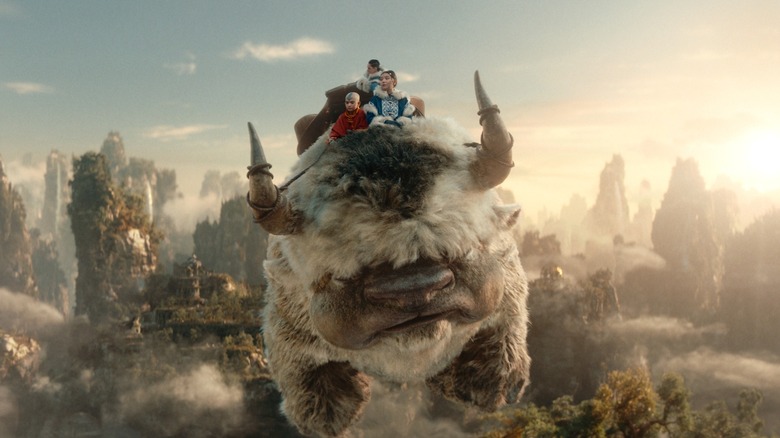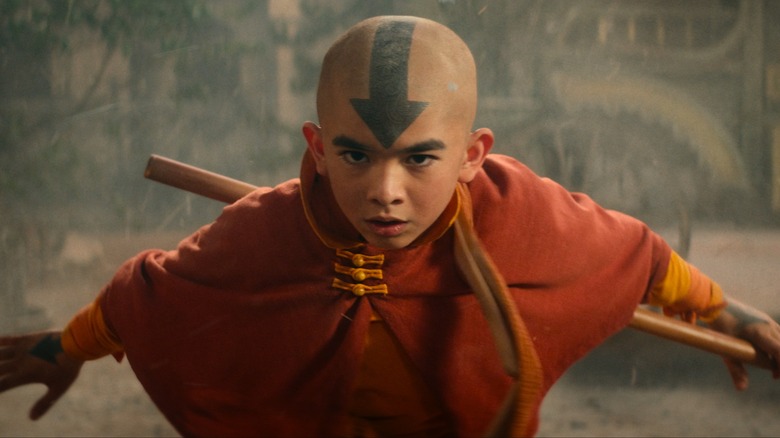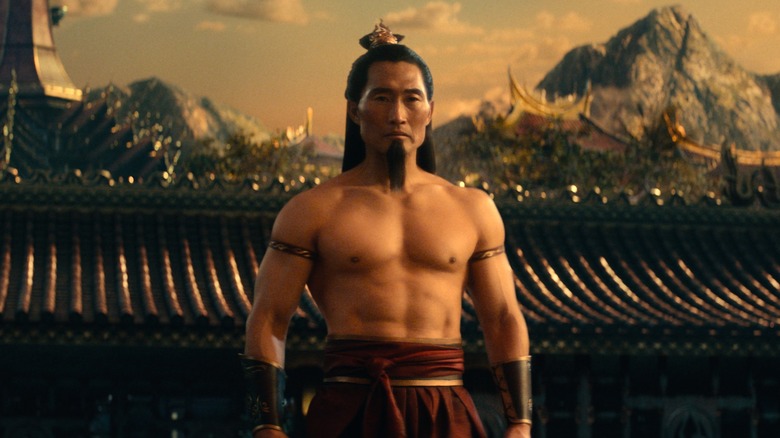Netflix's Avatar: The Last Airbender Opening Changes The Original Show In One Big Way
When it's 2005 and you're making a fantasy cartoon for Nickelodeon, you're allowed to start things off slow. You can open on two teenage siblings in a canoe, hunting for fish in the icy waters of the South Pole. Slowly, bit by bit, you can introduce more characters — mysteries whose backstories will be divulged in time. But when it's 2024, and you're making a prestige live-action streaming series, you have to start with a bang and a ton of exposition.
That's how Netflix's live-action "Avatar: The Last Airbender" adaptation kicks off. We see an Earth Kingdom spy being chased by soldiers in the Fire Nation capital. The message that he's carrying, and which he ultimately manages to send, reveals that Fire Lord Sozin is planning an attack on the Earth Kingdom. This all turns out to be a complicated ruse, though, as Sozin's real plan is to assault the Air Nomads during the Great Comet Festival and kill the young Avatar in their midst.
Diehard fans of the original series may notice a key change in this new version: In the cartoon, Fire Lord Sozin conquered territory in the Earth Kingdom more than 20 years before the official start of the Hundred Year War. Political tensions were taut well before the comet's arrival, though things had yet to escalate to global war. The Netflix series further complicates its new version of events by adding details to the genocide of the Air Nomads — details that actually make things more confusing.
Netflix's Avatar reveals some glaring questions from the original
In the original "Avatar: The Last Airbender" timeline, we never see Fire Lord Sozin's attack on the Air Nomads firsthand. We're told that it was brutal, abrupt, and successful. We're told that Aang is the last airbender, and no canon has ever denied that. The Netflix series details exactly how the Fire Nation conducted its genocidal attack, but in doing so, it opens up questions its predecessor avoided by remaining vague.
Sozin attacks the Southern Air Temple because all the other Air Nomads have gathered there for the Great Comet Festival. Later on, it's suggested that similar attacks were launched on the other temples afterward. The pitch here just feels iffy, though. As a nomadic people, it's highly unlikely that every airbender in the world would have been at the festival. From what we're shown, it looks like a couple hundred people at most. Even with so much strength, how could the firebenders get them all? Wouldn't some have flown away? It's awfully hard to catch an airbender, as Aang repeatedly proves.
These questions could just as easily be applied to the animated series, but because that show kept things out of view, it never really felt odd that Sozin accomplished his genocide so easily. The live-action series adds another quandary as well, which is why the airbenders would have made themselves so vulnerable on the night of a comet that boosts firebending.
Why weren't people more prepared for Sozin's Comet?
It's clear in the Netflix series that the Air Nomads are aware of Sozin's warmongering. They also have a tradition built around the Great Comet. They should know that it amplifies firebending. Earlier in the episode, council members discuss sending forces to help fortify the Earth Kingdom from a potential attack. This alone is a curious addition — the animated series makes it clear that the Air Nomads are detached from worldly politics and have no formal military — but it also makes it seem less likley that they'd leave themselves so vulnerable on such a dangerous night.
Beyond that, Sozin's plan is revealed to be kind of stupid here. He wants to kill the Avatar, but that only causes them to be reincarnated into the next nation in the cycle. In this case, that would be the Water Tribes, who are arguably a bigger threat to the Fire Nation than the Air Nomads anyway.
Again, most of these issues could also be brought against the original Nickelodeon series. It seems that there's a reason writers keep some things off the screen — a lesson Netflix may not have learned.


